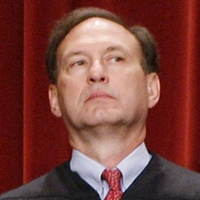5 of 10 Supreme Court Justices in History who Used Least Friendly Language are on the Court Now
 Justice Samuel Alito (photo: Charles Dharapak, AP)
Justice Samuel Alito (photo: Charles Dharapak, AP)
The U.S. Supreme Court today apparently includes some of the least friendly justices in the history of the bench.
A study of the court’s opinions, going back to 1791, included a ranking of 107 justices based on their choice of words used in opinions. It turns out five of the top 10 grumpiest justices are currently on the court. Justices Samuel Alito, Stephen Breyer, Clarence Thomas, Anthony Kennedy and Antonin Scalia and were found by study authors Keith Carlson, Michael Livermore and Daniel Rockmore to have used some of the most unfriendly language in their opinions in court history.
Chief Justice John G. Roberts Jr. and Ruth Bader Ginsburg were in the middle of the list, while Justices Sonia Sotomayor and Elena Kagan hadn’t been on the court long enough to be included in the study.
The study, which looked at about 25,000 opinions from 1791 to 2008, also found that opinions have gotten longer, but easier for a layman to understand. It looked for 7,000 words that are considered positive, such as “pre-eminent” and “adventurous,” and negative, such as “two-faced,” “admonish,” and “problematic,” according to Adam Liptak at The New York Times.
Older decisions are generally considered to be friendlier, which might account for the friendliest justice being John Jay, who was the first chief justice of the Supreme Court. The least friendly justice was also from that era, however. Thomas Johnson served less than two years on the court from 1791 to 1793. He’s followed on the list by Alito, Breyer, Thomas and Kennedy.
-Steve Straehley, Noel Brinkerhoff
To Learn More:
Justices’ Opinions Grow in Size, Accessibility and Testiness, Study Finds (by Adam Liptak, New York Times)
UVA Law-Dartmouth Team Traces Clerks' Influence on U.S. Supreme Court Through Computational Techniques (by John D. Cramer and Mary Wood, University of Virginia School of Law)
A Quantitative Analysis of Writing Style on the U.S. Supreme Court (by Keith Carlson, Michael A. Livermore and Daniel Rockmore, Washington University Law Review) (see page 20) (pdf)
For Supreme Court Justices, the Right to Free Speech Depends on the Speaker’s Politics (by Noel Brinkerhoff, AllGov)
- Top Stories
- Unusual News
- Where is the Money Going?
- Controversies
- U.S. and the World
- Appointments and Resignations
- Latest News
- Musk and Trump Fire Members of Congress
- Trump Calls for Violent Street Demonstrations Against Himself
- Trump Changes Name of Republican Party
- The 2024 Election By the Numbers
- Bashar al-Assad—The Fall of a Rabid AntiSemite






Comments